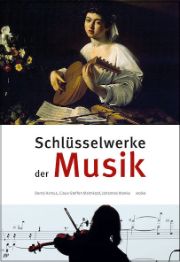A canon of masterpieces?
268 key works by 180 composers are presented in this book. However, the selection criteria remain vague.

Key works: On the one hand, these are pieces that open up something new to an era, so that everything is different than before. On the other hand, they are pieces that make an era accessible to us in retrospect, so that we understand it better. Which pieces would that be? Some of them, L'Orfeothe Ninth or the Wozzeck for example, it will be easy to agree, but then the discussion begins. And of course, everyone chooses differently!
And that is why even a first glance at the table of contents of this book raises doubts. Just one piece by Chopin, Ravel or Cage? No Antoine Brumel, Gottfried Heinrich Stölzel or Pierre Henry, but a piano concerto by Norbert Burgmüller or Guillaume Lekeu's piano quartet? And is Glenn Gould's interpretation of the Goldberg Variations as a work? It becomes even more difficult when the authors cannot decide on one work. For example, they choose one symphony each by Haydn and Mozart, but put all nine of Beethoven's works on one page and all of his piano sonatas on half a page. It is impossible to form a canon in this way.
Perhaps a book of "key works of music" should not be seen as a confirmation of one's own opinions, but rather as a challenge. And that's exactly what it is: 268 key works by 180 composers from the anonymous Middle Ages to the early 21st century are brought together here and discussed in exemplary fashion. However, these are often hardly portraits of works, but rather portraits of composers, based on one work. This also testifies to a certain indecisiveness towards the "key work".
Accessibility and comprehensibility are the order of the day: classical music is no longer something elitist, but easy to grasp, the authors claim at the beginning of the foreword, and they achieve this by trying not to get bogged down in technical terminology. Sometimes they succeed in telling little stories. They deconstruct clichés - and anecdotally create some of their own. The language contains wit and welcome irony in places, but is sometimes a little too flippant, for example when talking about Witold Lutosławski's Jeux vénitiens concludes: "The four short sentences are incredibly lively, especially the last one. The lagoon city should find itself reflected in them." What's that supposed to mean? Despite its many suggestions and information, the book leaves a somewhat ambivalent impression. A clearer concept would have helped.
Bernd Asmus, Claus-Steffen Mahnkopf, Johannes Menke: Key Works of Music, 304 p., € 26.80, Wolke, Hofheim 2019, ISBN 978-3-95593-125-4








